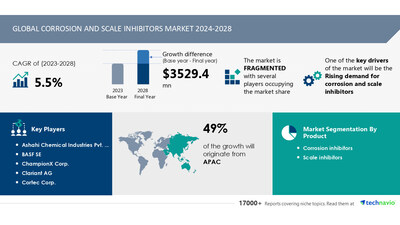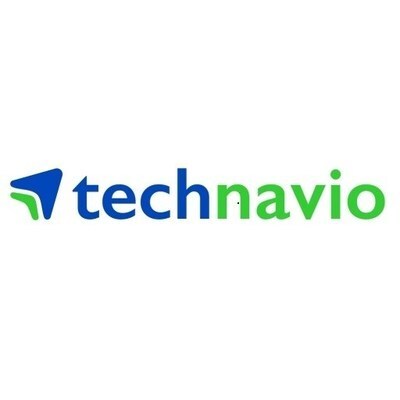Corrosion and Scale Inhibitors Market to Grow by USD 3.53 Billion (2024-2028) as Demand Surges, with AI Driving Market Transformation- Technavio
NEW YORK, Oct. 15, 2024 /PRNewswire/ -- Report with the AI impact on market trends - The Global Corrosion and Scale Inhibitors Market size is estimated to grow by USD 3.53 billion from 2024-2028, according to Technavio. The market is estimated to grow at a CAGR of 5.5% during the forecast period. Rising demand for corrosion and scale inhibitors is driving market growth, with a trend towards introduction of green inhibitors. However, rise in alternative technologies poses a challenge - Key market players include Ashahi Chemical Industries Pvt. Ltd., BASF SE, ChampionX Corp., Clariant AG, Cortec Corp., Croda International Plc, Dai ichi Karkaria Ltd., Daubert Chemical Company, Dow Inc., DuPont de Nemours Inc., Ecolab Inc., Evonik Industries AG, Henkel AG and Co. KGaA, Huntsman Corp., Kemira Oyj, Mersen Corporate Services SAS, Nouryon, Schlumberger Ltd., Solvay SA, and The Lubrizol Corp..
AI-Powered Market Evolution Insights. Our comprehensive market report ready with the latest trends, growth opportunities, and strategic analysis- View your snapshot now
Forecast period |
2024-2028 |
Base Year |
2023 |
Historic Data |
2018 - 2022 |
Segment Covered |
Product (Corrosion inhibitors and Scale inhibitors), Type (Organic compound and Inorganic compound), and Geography (APAC, North America, Europe, Middle East and Africa, and South America) |
Region Covered |
APAC, North America, Europe, Middle East and Africa, and South America |
Key companies profiled |
Ashahi Chemical Industries Pvt. Ltd., BASF SE, ChampionX Corp., Clariant AG, Cortec Corp., Croda International Plc, Dai ichi Karkaria Ltd., Daubert Chemical Company, Dow Inc., DuPont de Nemours Inc., Ecolab Inc., Evonik Industries AG, Henkel AG and Co. KGaA, Huntsman Corp., Kemira Oyj, Mersen Corporate Services SAS, Nouryon, Schlumberger Ltd., Solvay SA, and The Lubrizol Corp. |
Key Market Trends Fueling Growth
The global corrosion and scale inhibitors market is witnessing significant growth due to the increasing preference for eco-friendly and renewable inhibitors. These green inhibitors, obtained from natural sources like plants, are biodegradable, non-toxic, and environmentally friendly. They are gaining popularity in various industrial and municipal applications due to stringent regulations against toxic organic inhibitors. Types of green inhibitors include plant extracts, drugs, amino acids, rare earth metal compounds, and surfactant corrosion inhibitors. Research institutions and government organizations are investing in the development of innovative eco-friendly technologies, such as biofouling and sol-gel coatings, to produce new green inhibitors. For instance, the European Union is funding a project for an eco-efficient environmental technology to inhibit microbial-induced corrosion. This research will drive the growth of the global corrosion and scale inhibitors market during the forecast period.
The Corrosion and Scale Inhibitors market is experiencing significant growth due to increasing demand from various industries. Aviation turbine fuel and freshwater resources are key applications driving market expansion. Industrial manufacturers in sectors like pulp & paper, chemical processing, and metals are investing in corrosion-resistant alloys such as Duplex Stainless Steel to prevent corrosion. Infrastructural development and water treatment applications are also major markets for corrosion inhibitors. Inorganic corrosion inhibitors, water treatment chemicals, and organic corrosion inhibitors are popular choices. Water-based and oil-based Corrosion Inhibitors have their unique applications. Volatile Corrosion Inhibitors are gaining traction in metals processing. The chemicals industry uses both inorganic products like Phosphate-infused products and organic products like Platinum group metals. Scale inhibitors are essential in oil & gas industry for preventing scale formation in fluids. Biodegradable scale inhibitors are a sustainable solution for wastewater treatment plants. Aluminum, Potable water demand, Offshore spending, Geopolitics, and Phosphonate, carboxylate, and acrylic scale inhibitors are current trends. Market growth is influenced by factors like increasing demand for process & product additives, transportation fuel, and water treatment.
Insights on how AI is driving innovation, efficiency, and market growth- Request Sample!
Market Challenges
- The global market for corrosion and scale inhibitors is facing challenges due to the increasing adoption of non-chemical water treatment methods. Regulations in certain regions are pushing for the reduction and elimination of chemical treatment solutions, leading to investments in research and development for alternative technologies. UV disinfection, membrane filtration, and organic and biological treatments are gaining popularity. In North America, there is a significant focus on substituting traditional chemicals with these methods. This technological shift poses hurdles for the corrosion and scale inhibitors market. Environmental concerns and rising awareness are also contributing to the decrease in synthetic chemicals usage and the promotion of greener, non-chemical water treatment solutions. Consequently, the growth of the global corrosion and scale inhibitors market may be hindered during the forecast period.
- The Corrosion and Scale Inhibitors market faces several challenges in various industries. In the Aviation Turbine Fuel sector, the use of water for cooling systems can lead to corrosion and fouling. Freshwater resources are increasingly scarce, forcing Industrial manufacturers to seek effective corrosion inhibitors for their processes. The Pulp & Paper and Chemical Processing industries deal with corrosive substances, requiring the use of Corrosion-Resistant Alloys like Duplex Stainless Steel. Infrastructural development and Metals industry projects demand long-lasting protection against inorganic corrosion, making Water Treatment Chemicals essential. In the Oil & Gas industry, Scale Inhibitors are crucial for preventing mineral build-up in Fluids. Biodegradable Scale Inhibitors are gaining popularity due to environmental concerns. Potable water demand and Offshore spending drive the need for effective corrosion inhibitors. Geopolitics can impact the availability and cost of raw materials, affecting the market. The market offers various types of inhibitors, including Inorganic and Organic, Water-based and Oil-based, Volatile and Non-Volatile, Phosphate-infused products, and Platinum group metals. Inorganic inhibitors are effective against general corrosion, while Organic inhibitors protect against specific types. Phosphonate, Carboxylate, and acrylic Scale Inhibitors are commonly used in Water Treatment applications. The market caters to diverse industries, including the Chemicals industry for Metals processing, Wastewater treatment plants, and Aluminum production. Bio-based corrosion inhibitors are an emerging trend, offering eco-friendly alternatives.
Insights into how AI is reshaping industries and driving growth- Download a Sample Report
Segment Overview
This corrosion and scale inhibitors market report extensively covers market segmentation by
- Product
- 1.1 Corrosion inhibitors
- 1.2 Scale inhibitors
- Type
- 2.1 Organic compound
- 2.2 Inorganic compound
- Geography
- 3.1 APAC
- 3.2 North America
- 3.3 Europe
- 3.4 Middle East and Africa
- 3.5 South America
1.1 Corrosion inhibitors- The global corrosion and scale inhibitors market was valued at a significant size in 2023, with corrosion inhibitors being the largest segment. These inhibitors are widely used to safeguard equipment and infrastructure from corrosion in various industries, including heavy manufacturing, oil and gas, chemical, petroleum refining, water treatment, and product additives. Corrosion, which causes billions of dollars in losses annually, is a major concern for industries worldwide. Corrosion inhibitors mitigate these losses by protecting metals from environmental damage. Passivity inhibitors, also known as anodic inhibitors, form a protective film on metal surfaces, supporting their natural passivation. Common inorganic passivity inhibitors include sodium chromate, molybdates, hydroxides, silicates, nitrates, and phosphates. These inhibitors are extensively used in oil and gas piping, driving market growth. Precipitation inhibitors, or mixed inhibitors, form a precipitate on metal surfaces, obstructing both anodic and cathodic reactions. Silicates and phosphates are common precipitation inhibitors. Cathodic inhibitors prevent cathodic reactions during corrosion, forming insoluble precipitates on cathodic sites. Inorganic cathodic inhibitors include magnesium, nickel, and zinc ions. Volatile corrosion inhibitors, such as dicyclo-hexylamine, cyclohexylamine, and hexamethylene amine salts, are used in closed vapor spaces. The growing adoption of corrosion inhibitors in diverse applications will fuel market expansion during the forecast period. Despite regulatory restrictions on toxic inhibitors, green corrosion inhibitors and nanotechnology innovations will propel market growth.
Download complimentary Sample Report to gain insights into AI's impact on market dynamics, emerging trends, and future opportunities- including forecast (2024-2028) and historic data (2018 - 2022)
Research Analysis
The Corrosion and Scale Inhibitors market encompasses a wide range of chemical products used in various industries to prevent corrosion and scale formation in fluids. In the Oil & Gas industry, scale inhibitors are essential for maintaining the efficiency of production processes and ensuring the longevity of equipment. Scale inhibitors are primarily used in water treatment processes to prevent the deposition of mineral scales in pipelines and heat exchangers. The market includes both organic and inorganic inhibitors, with phosphonate and carboxylate being the most commonly used types. The demand for biodegradable scale inhibitors is increasing due to environmental concerns, particularly in the Oil & Gas and Water Treatment sectors. Other industries such as Metal & Mining, Power Generation, and Transportation Fuel also utilize corrosion and scale inhibitors to protect their assets. Geopolitical factors, offshore spending, and potable water demand are some of the key trends influencing the market's growth. The Organic segment, including bio-based corrosion inhibitors, is expected to grow significantly due to its eco-friendly nature and superior performance. Additionally, the market for Platinum Group Metals and Aluminum corrosion inhibitors is expected to expand as these metals are widely used in various industries.
Market Research Overview
The Corrosion and Scale Inhibitors market encompasses a wide range of chemical products used in various industries to prevent corrosion and scale formation in fluids. These inhibitors play a crucial role in the Oil & Gas industry, particularly in the production and transportation of oil and gas, where they help protect equipment from the damaging effects of water and mineral deposits. Scale inhibitors, specifically, are used to prevent the formation of hard mineral deposits, such as calcium carbonate and sulfate, in industrial processes and transportation fuels. Biodegradable scale inhibitors are gaining popularity due to increasing environmental concerns and potable water demand. Offshore spending and geopolitical factors also impact the market's growth. Phosphonate, carboxylate, acrylic, and sulfonate are common types of scale inhibitors, while corrosion inhibitors include inorganic and organic varieties. Water treatment, process & product additives, transportation fuel, aviation turbine fuel, freshwater resources, industrial manufacturers, pulp & paper industry, chemical processing industry, metals industry, and infrastructural development are major applications for corrosion and scale inhibitors. Aluminum, platinum group metals, and wastewater treatment plants are also significant end-users. Inorganic corrosion inhibitors, water treatment chemicals, organic corrosion inhibitors, water-based corrosion inhibitors, oil-based corrosion inhibitors, volatile corrosion inhibitors, and chemicals industry are key sectors contributing to the market's growth. Metals processing, inorganic products, phosphate-infused products, and bio-based corrosion inhibitors are emerging trends.
Table of Contents:
1 Executive Summary
2 Market Landscape
3 Market Sizing
4 Historic Market Size
5 Five Forces Analysis
6 Market Segmentation
- Product
- Corrosion Inhibitors
- Scale Inhibitors
- Type
- Organic Compound
- Inorganic Compound
- Geography
- APAC
- North America
- Europe
- Middle East And Africa
- South America
7 Customer Landscape
8 Geographic Landscape
9 Drivers, Challenges, and Trends
10 Company Landscape
11 Company Analysis
12 Appendix
About Technavio
Technavio is a leading global technology research and advisory company. Their research and analysis focuses on emerging market trends and provides actionable insights to help businesses identify market opportunities and develop effective strategies to optimize their market positions.
With over 500 specialized analysts, Technavio's report library consists of more than 17,000 reports and counting, covering 800 technologies, spanning across 50 countries. Their client base consists of enterprises of all sizes, including more than 100 Fortune 500 companies. This growing client base relies on Technavio's comprehensive coverage, extensive research, and actionable market insights to identify opportunities in existing and potential markets and assess their competitive positions within changing market scenarios.
Contacts
Technavio Research
Jesse Maida
Media & Marketing Executive
US: +1 844 364 1100
UK: +44 203 893 3200
Email: media@technavio.com
Website: www.technavio.com/
![]() View original content to download multimedia:https://www.prnewswire.com/news-releases/corrosion-and-scale-inhibitors-market-to-grow-by-usd-3-53-billion-2024-2028-as-demand-surges-with-ai-driving-market-transformation--technavio-302275070.html
View original content to download multimedia:https://www.prnewswire.com/news-releases/corrosion-and-scale-inhibitors-market-to-grow-by-usd-3-53-billion-2024-2028-as-demand-surges-with-ai-driving-market-transformation--technavio-302275070.html
SOURCE Technavio

 Index Options
Index Options CME Group
CME Group Nasdaq
Nasdaq Cboe
Cboe TradingView
TradingView Wall Street Journal
Wall Street Journal
